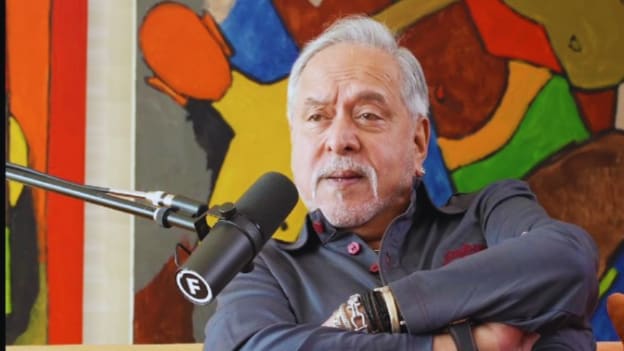Vijay Mallya speaks on Kingfisher scam, leaders challenge his ongoing vilification

In a new podcast that’s got everyone talking, Vijay Mallya—once known as the “King of Good Times”—has spoken publicly about the long-running controversy over his unpaid loans and departure from India. The former Kingfisher Airlines and United Breweries boss appeared on Raj Shamani’s popular show Figuring Out, and made his case: he insists he didn’t run away, and he definitely didn’t steal.
“You may call me a fugitive, but I didn’t run away. I flew on a prescheduled visit,” Mallya said during the episode. “If you want to call me a fugitive, go ahead, but where is the ‘chor’ (thief) coming from… where is the ‘chori’ (theft)?” Read his post.
The businessman, now living in the UK, said Indian banks have recovered ₹14,100 crore from him—more than double the ₹6,203 crore he was said to owe. He claimed he’s been unfairly used as a political scapegoat, even though the money has been recovered.
The episode has triggered serious discussions online and among business circles. Harsh Goenka, Chairman of RPG Enterprises, shared his views on X (formerly Twitter). “Vijay Mallya lived the high life, yes. Defaulted, yes,” he wrote. “Unlike most others, his ₹9,000+ crore dues are now reportedly settled. Meanwhile, bigger defaulters walk free with much fatter haircuts from banks. If dues remain, the banks should clearly say so. If not, why is he still a political punching bag? Justice must be fair, not selective.”
Goenka’s post struck a chord with many. It raised a critical question: if banks have recovered the money, why is Mallya still being singled out, while other defaulters seem to go unnoticed?
Not everyone agrees, though. Many on social media still see Mallya as a symbol of financial wrongdoing. His recent post cheering for Royal Challengers Bangalore (RCB) after their IPL win didn’t help either. While it might have been meant as a harmless celebration—he once owned the team—it quickly drew backlash. One user snapped, “RCB’s performance is high pressure, but Mallya sir, the banks are feeling even more pressure waiting for you.”
Despite the criticism, Mallya says he’s willing to return to India—if he can be assured of a fair trial and respectful treatment. He’s also called for full public clarity on how much money has actually been recovered from him. “Let’s sit down and do the maths properly,” he urged during the podcast, pushing for transparency from all sides.
The conversation has now shifted from just one man to a wider issue—how India deals with financial defaulters. Is the system fair? Or is public pressure driving decisions more than actual facts? Mallya’s case is making people take a closer look.
For many, the bigger issue is consistency. Why do some high-profile defaulters become household names, while others escape the spotlight? Mallya’s case, with its mix of business glamour, politics, and legal drama, has always attracted attention. But with his recent statements, and major recoveries claimed by banks, the mood around the story seems to be shifting—at least in part.
Mallya’s comments have come at a time when India is trying to show it’s serious about financial accountability. His podcast appearance might not change public opinion overnight, but it has certainly reignited the debate. Whether people support him or not, there’s growing agreement that the rules should be the same for everyone—and that justice shouldn’t be driven by headlines alone.













